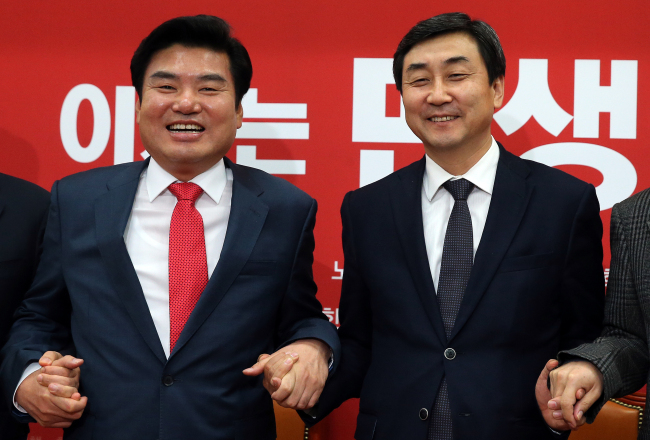Parliamentary sessions are set to resume this week after the main opposition party withdrew its six-day legislative boycott over the weekend, but prospects remain bleak as rival parties brace for heavy negotiation over key bills and next year’s budget.
Starting from Monday, the lawmakers are set to jump-start their review of the government’s proposal for the 2016 budget and resume their discussion on plans to determine electoral maps for the 2016 general election.
The rival parties are to hold a plenary session during the week to pass pending bills after suspending them last week as the opposition parties boycotted in protest over the government’s reinstatement of state-authored textbooks.
Starting from Monday, the lawmakers are set to jump-start their review of the government’s proposal for the 2016 budget and resume their discussion on plans to determine electoral maps for the 2016 general election.
The rival parties are to hold a plenary session during the week to pass pending bills after suspending them last week as the opposition parties boycotted in protest over the government’s reinstatement of state-authored textbooks.

“We have passed the first week in November. Given the amount of work we need to do to improve the citizens’ livelihoods, we must bring the Assembly back on track immediately. We urge the main opposition party to cooperate with the task,” said Rep. Shin Yee-jin, a spokeswoman for the ruling Saenuri Party.
But the Saenuri Party and the main opposition New Politics Alliance for Democracy are behind in the parliamentary schedule, as the lawmakers must determine the new electoral maps by Nov. 11 and complete the budget review by Nov. 30.
With about a month left on the legislative calendar -- the 19th Assembly’s regular session ends Dec. 9, the rival parties have clashed over a list of budget plans and pending bills to fund and implement the government’s key policies.
Among them are the budget plans for the publication of the state-authored textbooks and military procurement project that aims to produce 120 indigenous combat jets by 2025. The NAPD is urging the government to scrap the proposal to fund the textbook publications and reassess the procurement project.
The list also includes the budget for the government agencies’ “special operations,” which the Saenuri Party demands should be maintained as confidential, as well as the child care subsidies for toddlers the NPAD claims should be paid out by the central government instead of by municipalities.
Rival parties are also expected to lock horns over the budget for the government’s “Saemaeul” campaign to develop rural communities and implement measures to control flood and prevent prolonged drought in relation to the “Four Major Rivers Restoration Project” started by the former Lee Myung-bak administration. The NPAD rebukes the budget as a waste of taxpayers’ money.
They are also split on bills relevant to the medical and tourism industries, with the Saenuri Party supporting them to boost the economy while the NAPD asserts the bills would only benefit selected business sectors.
They are moreover at odds over whether to approve the ratification of the Korea-China free trade agreement that the government and the Saenuri Party are pushing to complete approval by the end of the year. The NPAD demands more protective measures for the agricultural sector before the agreement takes effect.
The Saenuri Party had pushed ahead with the review unilaterally last week and urged the parliamentary committees to finish their reviews promptly.
Having refused to acknowledge the Saenuri Party’s unilateral review, the NPAD asserted the committees should conduct a “thorough” review of what the NPAD called the government’s “contentious” proposals for budgets to fund some of the policies that failed to garner public support.
The rival parties also remained split over the scheme to determine the electoral rule for 2016 general elections. The Saenuri Party demanded that the number of representative lawmakers be reduced, while the NPAD opposed the move and demanded a revision to the representation system.
Meanwhile, the rival parties’ leadership met Sunday to discuss the future parliamentary schedule, but they failed to agree on a date to hold plenary sessions, though agreeing to resume the standing committee meetings.
By Yeo Jun-suk (jasonyeo@heraldcorp.com)








![[Graphic News] More Koreans say they plan long-distance trips this year](http://res.heraldm.com/phpwas/restmb_idxmake.php?idx=644&simg=/content/image/2024/04/17/20240417050828_0.gif&u=)
![[KH Explains] Hyundai's full hybrid edge to pay off amid slow transition to pure EVs](http://res.heraldm.com/phpwas/restmb_idxmake.php?idx=644&simg=/content/image/2024/04/18/20240418050645_0.jpg&u=20240419100350)





![[From the Scene] Monks, Buddhists hail return of remains of Buddhas](http://res.heraldm.com/phpwas/restmb_idxmake.php?idx=652&simg=/content/image/2024/04/19/20240419050617_0.jpg&u=20240419175937)

![[KH Explains] Hyundai's full hybrid edge to pay off amid slow transition to pure EVs](http://res.heraldm.com/phpwas/restmb_idxmake.php?idx=652&simg=/content/image/2024/04/18/20240418050645_0.jpg&u=20240419100350)

![[Today’s K-pop] Illit drops debut single remix](http://res.heraldm.com/phpwas/restmb_idxmake.php?idx=642&simg=/content/image/2024/04/19/20240419050612_0.jpg&u=)